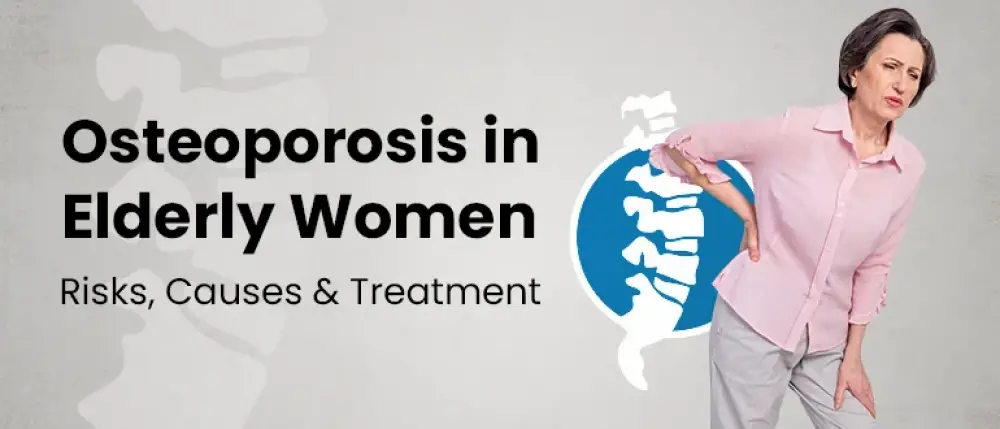Subscribe to get weekly insights
Always stay up to date with our newest articles sent direct to your inbox
Published on 7 Aug, 2024
Updated on 7 Mar, 2025
592 Views
4 min Read

Written by Mudit Handa
favorite0Like
favoriteBe the First to Like
Osteoporosis is a condition that causes bones to become weak and brittle, increasing the risk of fractures, especially in postmenopausal women. Osteoporosis is often called a silent disease because of the lack of any symptoms. You are diagnosed only when you experience a fracture. The disease can cause low-trauma bone fractures in older women, most commonly in the hip, spine and wrist.
Osteoporosis can affect both men and women, but did you know that women are more susceptible to this condition than men? This blog will discuss what are the risk factors, causes, and treatment of osteoporosis in elderly women.
Osteoporosis means porous bone. It is a degenerative bone disease in which the bone loses density and becomes thinner. Bone needs density and strength to support body weight and to absorb any impact. However, as you age, your bone loses density and becomes fragile. Fortunately, there are ways to prevent osteoporosis in elderly females by maintaining bone density and protecting fractures.
Bones are living tissue in our body that keeps replacing their cells throughout life. Till the age of 30 years, bones naturally replace the old broken bone cells with new bone cells. However, as you age, the bone breakdown becomes faster than the replacement, causing a loss of bone mass. The two primary reasons that cause osteoporosis in women are;
Many factors contribute to an individual's development of osteoporosis. The following people are at risk of developing osteoporosis:
Since osteoporosis has no symptoms, you should get a bone density test if you have any of the above risk factors. A bone density test or a DEXA scan is an imaging test that tests the strength of the bone by measuring the amount of calcium and minerals present in the bone.
The treatment for osteoporosis involves the prevention of geriatric fractures and slowing down bone loss in different ways.
Regular exercise is essential to strengthening bones and muscles so that you can maintain balance and reduce the risk of falling. Weight-bearing exercises like walking, jogging, and climbing strengthen the bones in your hip, spine, and legs. You should consult a trained physical therapist who can suggest exercises that are right for you.
Consult your doctor to determine your vitamin and mineral requirements and maintain them using a healthy diet and supplements. Vitamin D, calcium, phosphorus, and proteins are necessary for overall bone health.
Smoking and drinking reduces your bone density and leads to bone loss. It also slows down the healing process in case there is a fracture.
The doctor may advise medication in severe cases according to your medical history. It includes hormone therapy using replacement estrogen and parathyroid hormone analogues given as injections.
Broken bones affect an older adult differently compared to a young individual. This is because healing is slower in old age and can take a much longer time, affecting the daily life and activities of an elderly individual. When a senior is not able to walk or perform routine activities due to a broken bone, they become dependent and may end up in long-term care. This immobility may also lead to other health concerns, such as mental stress, cardiac issues, and frequent infections.
A fracture happens when bone tissue is subject to a force greater than its strength. These forces may be tensile, sheer or compressive. As you age, the type of fracture and its incidence changes. Even a mild force or trauma can cause a fracture due to brittle bones in older people.
The most common fractures in elderly people are fractures in vertebrae, shoulder, wrist, hip, and knee joints. Hip fractures are the most common type of fracture. Even a fall after a slip can cause a hip fracture due to compression.
You can not prevent bone aging, but you can prevent osteoporosis. Embrace a healthy and active lifestyle from a young age to maintain good bone health and body weight. Eat well, maintain your calcium and vitamin D levels, and exercise regularly to prevent osteoporosis in old age.
Invest in a comprehensive health insurance policy from a young age. This policy should cover preventive checkups and provide wellness benefits to help you monitor your health and stay motivated to stay fit and active. If you don't have a health insurance plan yet, contact Care Health Insurance to get coverage and enjoy cashless services at their network of 21600 healthcare providers.
>> Also Read: How Can I Increase My Bone Density?
Disclaimers: The above information is for reference purposes only. Kindly consult your general physician for verified medical advice. The health insurance benefits are subject to policy terms and conditions. Refer to your policy documents for more information.
favoriteBe the First to Like
शुगर कंट्रोल कैसे करे? जानें, डायबिटीज में क्या खाना चाहिए Care Health Insurance in Health & Wellness
Thyroid : मामूली नहीं हैं महिलाओं में थायराइड होना, जानें इसके लक्षण और घरेलू उपचार Care Health Insurance in Diseases
हाई ब्लड प्रेशर को तुरंत कंट्रोल कैसे करें? देखें इसके उपाय Care Health Insurance in Diseases
प्लेटलेट्स की कमी के लक्षण, कारण और इलाज क्या है Care Health Insurance in Diseases
What is IBS? Signs, Triggers & Solutions that Work Care Health Insurance in Diseases
What is Endocrinology? Hormones, Disorders & Treatment Care Health Insurance in Diseases
Do People with Mental Illness Have Less Heart Disease? Care Health Insurance in Diseases
एक्जिमा क्या है? देखें, इसके लक्षण और इलाज Care Health Insurance in Diseases